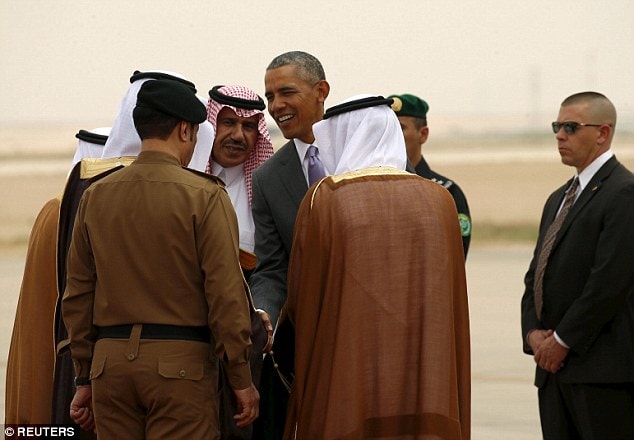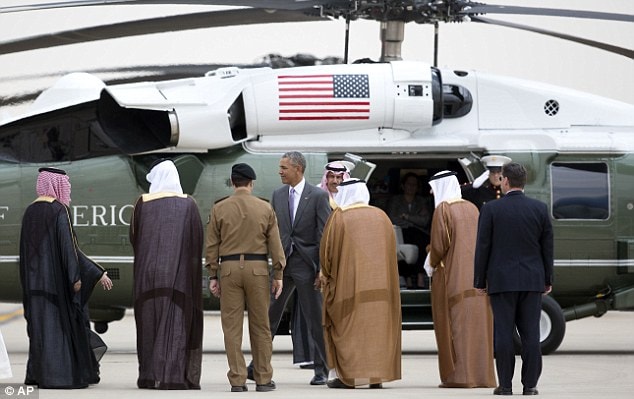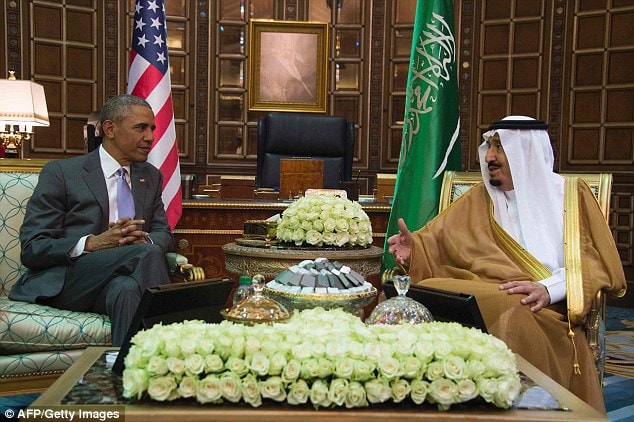US - Saudi Arabia: 'Broken marriage'?
(Baonghean.vn)-On April 20, President Barack Obama visited2to Saudi Arabia, a close ally of the United States for more than 70 years. However,,The reality is that one of the oldest allies in the Middle East has long ceased to share common interests and values with Washington..And this trip of Mr. Obama is considered a special "mission" to save the relationship.no moresome warmth between Washington and Riyadh.
 |
| Saudi Arabian officials welcome President Obama at Riyadh's international airport. Photo: Reuters. |
President Obama did not receive a formal welcome from Saudi Arabia, with only a small delegation of low-ranking officials welcoming him at Riyadh airport, and Saudi state television did not broadcast images of the White House leader boarding the plane to begin his visit to the country.
Senior Saudi officials have made it clear that relations with the US can only improve after Obama leaves office. Saudi Arabia was angered by the Obama administration's approval of the historic nuclear deal with Iran. Riyadh believes the next US president could restore Saudi Arabia's position as America's main ally in the Middle East.
Is Saudi Arabia an ally of the United States?
Explaining the relationship between the United States and Saudi Arabia is not as simple as looking at America's relationship with other close democratic countries like Britain or Canada.
Saudi Arabia is a Middle Eastern country that is authoritarian, discriminates against women, denies religious freedom and restricts press freedom. It is the birthplace of Wahhabism, with its rigid belief that “There is no god but Allah.”
Saudi Arabia, however, is not an Islamic state. The kingdom does not seek to undermine religious order, sponsor terrorism against the West, or establish a Caliphate. On the contrary, Saudi Arabia is a victim of jihadist terrorism, and its officials are working closely with the United States to fight al-Qaeda in Yemen and are part of a military coalition against the Islamic State in Iraq and Syria.
However, behind these noble goals, Saudi Arabia is accused of harboring terrorist groups that are raging in Syria such as IS or al-Nusra Front, an al-Qaeda branch. Saudi Arabia's oil money and its evil Wahhabi ideology are fertile ground for these extremist groups. And most recently, Riyadh's threat to sell hundreds of billions of dollars in US assets if the US officially sues the country for its involvement in the 9/11 terrorist attacks has shown a growing gap in the bilateral relationship.
 |
| US visit to Saudi Arabia amid strained alliance relations. Photo: AP. |
Are US-Saudi Arabian interests fundamentally divided?
The grand bargain that would have allowed the United States access to Saudi oil in exchange for a U.S. commitment to provide Riyadh with security from outside threats has been broken, despite the Obama administration selling nearly $100 million in arms to Saudi Arabia. There are still major differences between the two countries on core issues such as Syria, Iran, the Israeli-Palestinian conflict, Egypt and regional democratization.
The foundation for Riyadh's suspicion and distrust is further compounded by the US's lack of interest in its traditional allies in the Gulf and its openness to Iran.
Is Saudi Arabia headed for instability and collapse?
Not necessarily, although some analysts believe the country is on the verge of collapse. Saudi Arabia has serious problems.
The sharp drop in oil prices has caused a significant budget deficit and forced the Riyadh government to tighten spending, while Saudi Arabia is embroiled in a costly war in Yemen and under pressure from its increasingly powerful rival Iran after the lifting of economic sanctions. However, Saudi Arabia remains a stable country, with the world's largest oil reserves, low public debt and high cash reserves.
Compared to Egypt, Yemen, Syria, Iraq, or Lebanon, Saudi Arabia still seems like a model of stability. But the internal problems of power transition could complicate the relationship between Washington and Riyadh and create greater tensions in the years to come. Saudi Arabia will change; the question is whether that change will be evolutionary or revolutionary.
 |
| President Obama meets with King Salman bin Abdulaziz of Saudi Arabia at Egra Palace in the capital Riyadh on April 20. Photo: AFP. |
MUS-Saudi Arabia relationsimportant enough to fail?
That is to say. Despite its problematic policies toward Saudi Arabia, the United States still needs its friends in the region to help stabilize the situation and pursue its interests. And as long as crude oil remains a single market, a disruption in supply would have a huge impact on economies and markets around the world, including the United States.
Therefore, it is obvious that the stability of Saudi Arabia in particular and the Gulf region in general remains a core concern of the US. Moreover, Washington still needs Riyadh in terms of intelligence sharing and the fight against IS and al-Qaeda terrorist branches in Yemen, as well as cooperation with Riyadh to resolve the Syrian crisis.
QImproved alliance relations under the new President?
It is clear that Saudi Arabia is looking forward to the administration of the new President to replace the current President Obama. Mr. Obama said that Saudi Arabia is “freeloading” the benefits of the US security guarantee, without a fair response in supporting US goals.
It is a painful reality that the US is entangled in a “bad marriage” with Saudi Arabia, which cannot be divorced nor can be reconciled peacefully. Therefore, during President Obama’s visit to Saudi Arabia this time, Washington wants to take advantage of the US-Gulf Cooperation Council (GCC) Summit on April 21 as a good opportunity to strengthen bilateral relations, as well as to mediate between Iran and the Gulf Arab countries./.
Lan Ha
(According to CNN)
